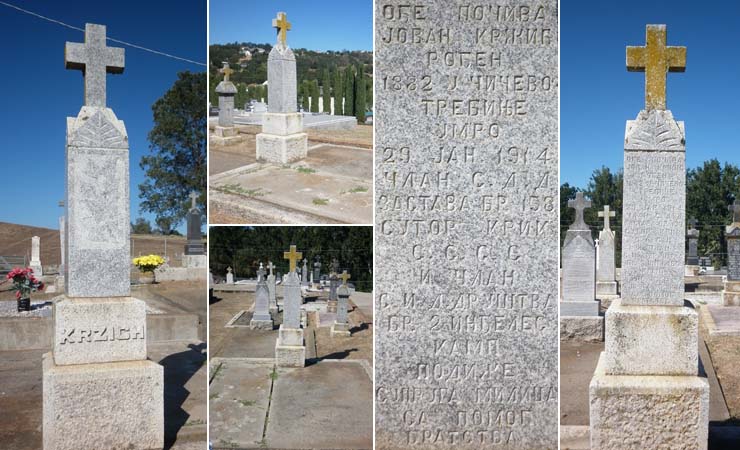1882 - 1914
ОЂЕ ПОЧИВА
ЈОВАН КРЖИЋ
РОЂЕН
1882 У ЧИЧЕВО
ТРЕБИЊЕ
УМРО
29. ЈАН. 1914
ЧЛАН С. Д. Д.
ЗАСТАВА БР. 158
СУТОР КРИК
С. С. С. С.
И ЧЛАН
С.И. Д. ДРУШТВА
БР. 2 ИНЂЕЛС
КАМП
ПОДИЖЕ
СУПРУГА МИЛИЦА
СА ПОМОЋ
БРАТСТВА
A great man is one who collects knowledge the way a bee collects honey and uses it to help people overcome the difficulties they endure - hunger, ignorance and disease!
- Nikola Tesla
Remember, remember always, that all of us, and you and I especially, are descended from immigrants and revolutionists.
- Franklin Roosevelt
While their territory has been devastated and their homes despoiled, the spirit of the Serbian people has not been broken.
- Woodrow Wilson

1882 - 1914
ОЂЕ ПОЧИВА
ЈОВАН КРЖИЋ
РОЂЕН
1882 У ЧИЧЕВО
ТРЕБИЊЕ
УМРО
29. ЈАН. 1914
ЧЛАН С. Д. Д.
ЗАСТАВА БР. 158
СУТОР КРИК
С. С. С. С.
И ЧЛАН
С.И. Д. ДРУШТВА
БР. 2 ИНЂЕЛС
КАМП
ПОДИЖЕ
СУПРУГА МИЛИЦА
СА ПОМОЋ
БРАТСТВА